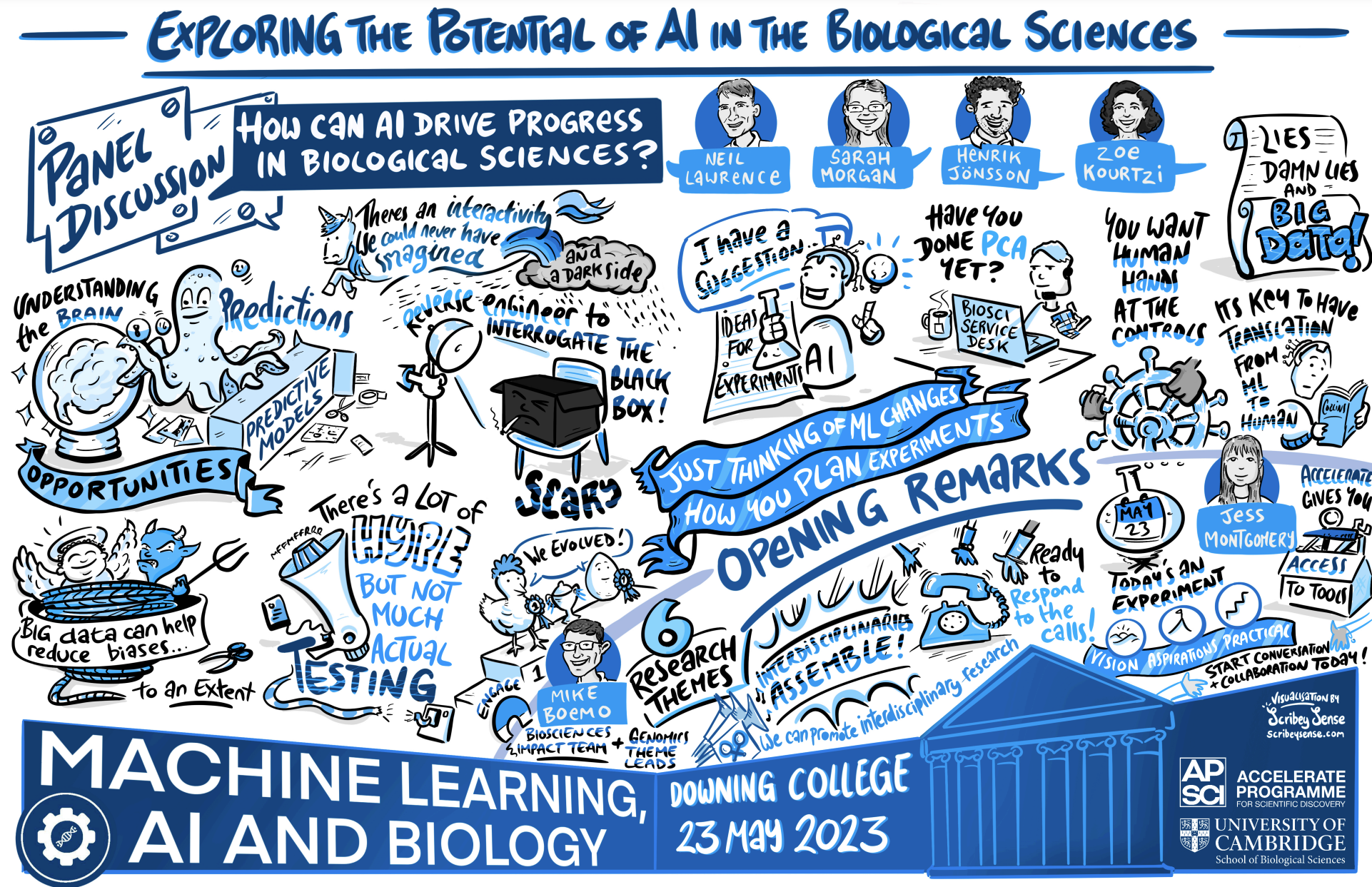How can we… use AI to support clinical decision-making in intensive care?
19 February 2026
Katie Light, Programme Manager
19 June 2023
In recent years, there have been some high profile breakthroughs in using machine learning to aid biological understanding, perhaps most famously including AlphaFold which predicts protein structure from amino acid sequences. Within Cambridge, there are a range of groups already working in this space from engineering a model to learn more about schizophrenia to understanding the cell biology of parasites.As part of our work with the AI for Science community in Cambridge, Accelerate was keen to dig deeper into this area and engage with the community to understand the work currently taking place and build a vision for the future of AI and the biological sciences.
In collaboration with the School of Biological Sciences’ Functional and Evolutionary Genomics Theme, the Accelerate Programme brought together 45 researchers from 12 departments across Cambridge at a workshop on 23 May to explore the potential that AI has in the field and how the community can develop a roadmap to drive progress in this area.
How can AI drive progress in the biological sciences?
Opening the discussions, Dr Mike Boemo, co-lead of the Functional Genomics theme and Jess Montgomery, Accelerate’s Executive Director outlined the vision for the day as a starting point for conversations and collaborations and to generate ideas on the steps needed to achieve the aspirations for AI in the biological sciences.
A panel discussion chaired by Professor Neil Lawrence explored the question How can AI drive progress in the biological sciences? Panelists Dr Sarah Morgan, Professor Henrik Jönsson and Professor Zoe Kourtzi discussed the complex journey of implementing machine learning methods in AI, drawing on their work in psychology and plant sciences. The panel reflected that using machine learning methods encouraged them to think differently about how they planned experiments and that it had potential to unlock insights that were preciously unattainable. The role of humans in AI enabled discovery also emerged as a theme and the panel considered a key step to be the translation of understanding from machine learning to humans.
Collaboration is key
Establishing genuine collaboration with computationalists emerged as a driver for success in the workshop session focussing on the steps needed to achieve the potential of AI in the field. Whilst expertise in both computation and experimentation exists, attempts connecting the two can encounter barriers in terms of access to data and terminology. Vocabulary that is widely established in one field can have a different meaning in another, the term model was given as an example which in biology refers to a model organism whilst in the machine learning community most likely refers to a computational model. Consistent data is also a barrier, if groups record data in different formats or do not all record the same information then interoperability across datasets will be limited. To collaborate effectively therefore establishing shared language and data standards is key. Participants highlighted the role for training at all stages and for funding to enable interdisciplinary research.
Applying AI tools to biological questions
A diverse range of research exploring applications of AI to the biological questions was showcased by researchers across the School in a series of flash talks. These included how AI can be used in disease prediction both in mental health and in the gut microbiome and applications of machine learning methodologies from the single cellular level to the macro level of improving control of invasive plant diseases.
Where next? Moving closer to fulfilling the potential in the field
The final session of the day explored routes for engaging with machine learning in Cambridge, including Accelerate’s Machine Learning Engineering Clinic which offers support to researchers across the research pipeline.
In addition to technical support from the clinic, Accelerate and C2D3’s current funding call provides the opportunity for researchers to receive small grants that can be deployed flexibly to start or scale interdisciplinary collaborations in the use of AI for research and innovation. Professor Elizabeth Soilleux, an awardee in the 2022 funding call, shared details of her project optimizing an algorithm that can identify coeliac disease from duodenal biopsies, with 97–99% accuracy.
The depth and breadth of discussions throughout the day showed the range of biological applications of machine learning already taking place in Cambridge and the excitement within the School for how the field can develop. With collaboration highlighted as a key force in the AI for Science space, the Accelerate programme will continue to build our connections with researchers across the University and to provide funding and support to implement machine learning in research. This workshop is the first of a series of planned workshops engaging with researchers implementing machine learning in their work across the University, get in touch with us if you are interested in co-hosting future sessions in your research area.
University of Cambridge researchers can access materials from the day on the School of Biological Sciences Information Hub.
Artist Dan Andrews recorded discussions from the day in a series of graphic captures which can be viewed here.
